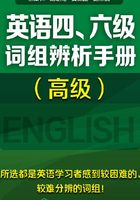
11 all in all; as a whole; at large; by and large; in all; in a word; in general; in one word; in the large; in sum; on the whole; to sum up; upon the whole
● all in all意为“总的说来”,常位于句首,用逗号分开,修饰整句。如:His reaction to the doctor’s treatment is all in all, satisfactory.(他对医生治疗的反应总的说来还是令人满意的。)All in all, their financial condition is not bad.(总的来说,他们的经济情况并不坏。)He has his faults, but, all in all, he is a good helper.(他虽有缺点,但总的来说,他是个好帮手。)All in all, his condition is greatly improved.(总的来说,他的情况有了很大的好转。)
● in all也有“总的说来”之意,可与all in all换用,如:(All) In all, they did very well.(总的来说,他们干得很好。)(All) In all, it was a pleasant trip.(总之,那是一次愉快的旅行。)
● in all还可放在句末,如:We won five games and lost one, doing very well in all.(我们五胜一负,总之,干得不错。)
● all in all和in all都有“总共”之意,如:All in all there were thirty present at the seminar. Four of them were graduate students from this collage.(总共有三十人出席了研讨会,有四人是这个学院的研究生。)The repairs come to $500 in all.(修理费总共500美元。)In today’s class there were six absentees all in all.(今天上课总共6人缺席。)
● all in all还有其他意思,如:She has quite a few hobbies, yet music in his all in all.(她有不少爱好,但最最喜爱的是音乐。)
● by and large的意思是“总的说来”“基本上”,在句中位置灵活。如:By and large I think the emphasis should be on recruiting the right people.(总的来说,我认为重点应放在招收合适的人员上。)By and large, women can bear pain better than men.(通常女人的忍痛能力比男人强。)There’s a few small things that I don’t like about my job, but by and large it’s very enjoyable.(工作中有几件小事我不喜欢,但总的来说还是很愉快的。)There ware bad days, but it was a pleasant summer, by and large.(夏天虽有恶劣气候,但总的来说,是令人愉快的季节。)
● at large与in (the) large也表“总的来说”,但不常用,如:Boys at large like games.(一般说来,男孩都爱运动。)That was a problem seen in large.(那是一个从全局观点来看的问题。)
● in a word, in one word也意为“总之”,多置于句首,常用逗号隔开。如:In a word, she is warm-hearted.(总之,她是热心肠的。)In a word, while the prospects are bright, the road has twists and turns.(总之,前途是光明的,道路是曲折的。)In one word, I don’t like him.(一句话,我不喜欢他。)You certainly picked the right person for that job, James. In one word, she’s the best engineer this firm’s ever employed. (你的确挑中了合适的人来干那件工作,詹姆斯,总之,她是这家公司所聘用的迄今最优秀的工程师。)
● in sum意为“总之”,常放在句首,用逗号隔开。如:In sum, such thing should not be allowed to happen lere.(总之,这样的事在这里决不允许发生。)In sum, we had the opportunity to dominate events.(总之,我们有左右事态的机会。)In sum, the decision of the committee is to go ahead as planned.(总之,委员会决定按计划进行。)In sum, Mr. Morgan’s report wasn’t perspective at all. (总之,摩根先生的报告讲得一点也不透彻。)
● on the whole也写成upon the whole,意为“总之”,是本组词组中最常用的一组,位置灵活,一般用逗号分开,修饰全句。如:I’m in favour of the proposal, on the whole.(总的说来,我赞成这个提议。)On the whole, children begin walking when they are about one year old.(通常小孩一岁左右开始学走路。)You have made a few mistakes in your composition, but on the whole you have done well.(你的作文中有几个错误,但总的说来写得不错。)Upon the whole, we had a good holiday, but the weather was not up to much.(总的来说,我们的假日过得不错,但天气不怎么好。)
● as a whole意为“总的来说”,与on the whole一样都可修饰全局,作状语、补语和插入语,但as a whole还可修饰前面的名词。如:We must consider these matters as a whole, not one by one.(我们必须通盘地而不是一件一件孤立地来考虑这些事件。)We should say that the Chinese people as a whole are living a better life.(我们应该说,中国人民的生活总体上有了改善。)We should analyses the novel as a whole in stead of concentrating only on wording.(我们应该把这部小说作为一个整体来分析,而不仅仅把注意力集中在词语用法上。)Is the collection going to be divided up or sold as a whole?(这些收藏品是零卖还是一起卖?)
● to sum up意为“总之”,作插入语,置于句首时,多用逗号分开。如:To sum up, she could not hope to pass the exam.(总之,她没希望能通过这次考试。)So, to sum up, we’ve got to pay more attention to profitability and cost control.(因此,概括地说,我们必须更加关心赢利和成本控制。)All the students in the class, to sum up, agreed that she was a perfect teacher.(总之,全班同学公认她是位优秀教师。)To sum up, he is a spoiled boy.(总而言之,他是一个被宠坏了的男孩。)
● in general意为“总之”“通常”,作状语与插入语,其位置较灵活。如:In general, women live five to ten years longer than men.(总体来说,女性的寿命比男性长5~10年。)In general, I think you are right.(总的说来,我觉得还是你对。)Children are, in general, simple and naughty.(孩子们通常是单纯的,调皮的。)The weather in winter here is cold in general.(这里的冬天通常很冷。)